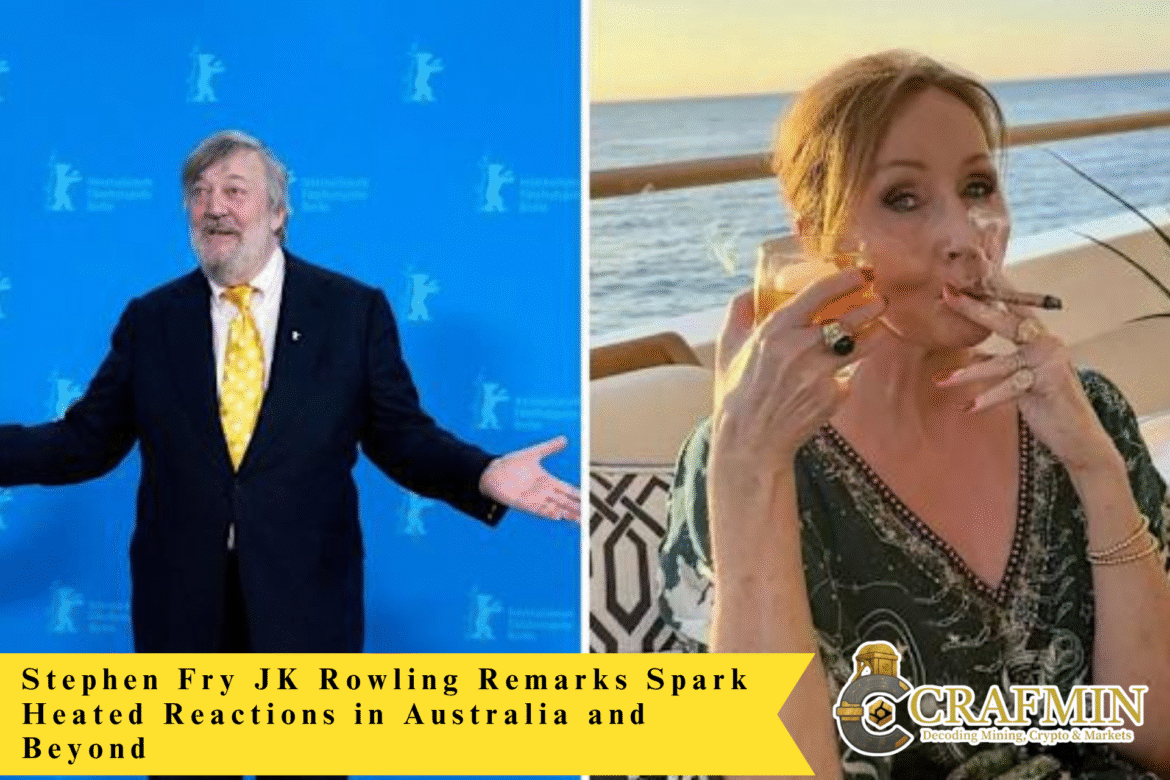British actor and writer Stephen Fry has stirred global headlines once again, this time for his candid remarks about JK Rowling, calling her “a lost cause” in ongoing cultural debates. As expected, the internet didn’t sit quietly. In Australia, where Rowling’s works continue to inspire young readers, the backlash and support for Fry’s opinion have split public sentiment.

Stephen Fry in conversation at a Sydney event, where past comments on literature and culture gained wide attention. (AP Photo)
The Fry-Rowling Divide Resurfaces
Stephen Fry’s comment came during a podcast interview where he addressed his discomfort with the cultural climate surrounding JK Rowling, particularly the polarisation her views on gender identity have created.
“I don’t hate her,” Fry said, “but I think she’s become unreachable on the topic. A lost cause, maybe.”
Though delivered without malice, the term “lost cause” reverberated online. Critics labeled Fry dismissive, while supporters argued he was simply acknowledging the impossibility of reconciliation in the current climate.
Also Read: Australia Champions Critical Minerals and Security Partnerships at G7 Summit
Australian Fans React—Loudly
Australian social media has exploded with opinion threads on X (formerly Twitter), Reddit, and TikTok, where Fry’s words were clipped, quoted, and dissected. Some say his candour was refreshing. Others believe it betrayed Rowling, with whom Fry had worked closely while narrating the Harry Potter audiobooks.
Public reaction in Australia mirrored broader global discourse, but with added context. Rowling’s books remain part of the curriculum in some Australian schools, and the cultural tug-of-war over her influence continues.
Cultural commentator Marla Jennings, based in Melbourne, noted:
“Australia is stuck in the same cultural tension. We admire Fry’s wit and Rowling’s imagination. But we’re also reassessing what we celebrate and how.”
Entertainment News Meets Cultural Reckoning
The Stephen Fry JK Rowling controversy adds another chapter to the larger conversation about how celebrities influence cultural narratives. Rowling has faced years of scrutiny for her views on trans rights, and public figures speaking about her—pro or con—often find themselves at the centre of online storms.
Stephen Fry, long admired in Australia for his intelligence and advocacy for mental health, is now facing unusual criticism from progressive circles, even though he has not made a habit of attacking Rowling.
Still, his decision to weigh in—even diplomatically—was enough to make headlines.
Can Literary Legacy Survive Cultural Fallout?
The growing question for Australians is whether Rowling’s literary contributions can be separated from her personal views—and if those who comment on her legacy, like Fry, risk alienating themselves.
Bookstores in Sydney and Melbourne reported an increase in discussions around Harry Potter’s place in modern culture. “We’ve seen more people asking if they should still buy her books,” said Chloe Ranford, a bookseller in Adelaide.
Source; 7NEWS Australia.
The Social Media Machine: Amplifier or Aggravator?
Fry’s remarks gained traction because of social media virality. Within hours, his quotes were trending on Australian X feeds and featured in TikTok explainer videos dissecting “cancel culture,” “celebrity virtue signalling,” and “freedom of speech.”
The emotional weight of the Rowling debate continues to ignite reaction loops across digital platforms, often far removed from nuance. For Fry, a man known for carefully chosen words, this may have been one of his most unexpected controversies.
A Deeper Reflection
This viral moment reflects a broader truth: celebrities—especially those with ties to culturally iconic figures—walk a tightrope when offering opinions in polarised times.
In Australia, where Fry enjoys an almost academic level of admiration, the episode is less about “taking sides” and more about asking how far public figures should go in weighing in on divisive issues.
As one Canberra-based columnist noted,
“It’s a Stephen Fry quote. Even in criticism, it carries class. But that doesn’t mean it’s immune to interpretation or backlash.”
Final Thoughts
Whether or not one agrees with Stephen Fry’s assessment, the uproar it generated underlines just how fractured public discourse has become. In Australia and elsewhere, debates around cultural icons like JK Rowling have moved from publishing houses and libraries into the unpredictable realm of digital outrage.
As for Fry, he has remained quiet since the comment went viral—perhaps signalling that even the wisest among us now fear being misunderstood.


